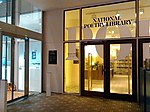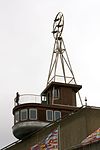Royal Festival Hall

The Royal Festival Hall is a 2,700-seat concert, dance and talks venue within Southbank Centre in London. It is situated on the South Bank of the River Thames, not far from Hungerford Bridge, in the London Borough of Lambeth. It is a Grade I listed building, the first post-war building to become so protected (in 1981). The London Philharmonic Orchestra, the Philharmonia Orchestra and the Orchestra of the Age of Enlightenment are resident in the hall.The hall was built as part of the Festival of Britain for London County Council, and was officially opened on 3 May 1951. When the LCC's successor, the Greater London Council, was abolished in 1986, the Festival Hall was taken over by the Arts Council, and managed together with the Queen Elizabeth Hall and Purcell Room (opened 1967) and the Hayward Gallery (1968), eventually becoming an independent arts organisation, now known as the Southbank Centre, in April 1998.The complex includes several reception rooms, bars and restaurants, and the Clore Ballroom, accommodating up to 440 for a seated dinner. A large head and shoulders bust of Nelson Mandela (by Ian Walters, created in 1985) stands on the walkway between the hall and Hungerford Bridge approach viaduct. Originally made in glass-fibre it was repeatedly vandalised until re-cast in bronze.The complex's variety of open spaces and foyers are popular for social or work-related meetings. The closest tube stations are Waterloo and, across the river via the Jubilee Bridges, Embankment and Charing Cross.
Excerpt from the Wikipedia article Royal Festival Hall (License: CC BY-SA 3.0, Authors, Images).Royal Festival Hall
Belvedere Road, London Lambeth (London Borough of Lambeth)
Geographical coordinates (GPS) Address Nearby Places Show on map
Geographical coordinates (GPS)
| Latitude | Longitude |
|---|---|
| N 51.505836111111 ° | E -0.11678888888889 ° |
Address
Southbank Centre
Belvedere Road
SE1 7NA London, Lambeth (London Borough of Lambeth)
England, United Kingdom
Open on Google Maps










